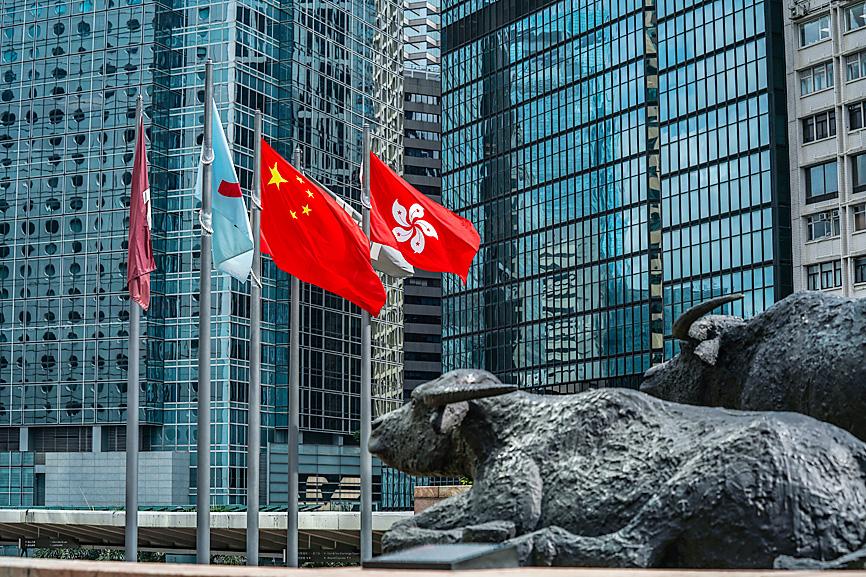The number of Hong Kongers applying for residency in Taiwan reached 892 last month, a monthly high for this year, National Immigration Agency (NIA) statistics showed.
The number increased 70 percent from 525 in the same period last year, after Beijing imposed national security legislation on Hong Kong on June 30. The law defines and prohibits acts of secession, subversion, terrorism and collusion with foreign forces.
As of last month, 4,775 Hong Kongers had filed for residency in Taiwan this year, the NIA statistics showed.

Photo: Bloomberg
From January to June, 710, 832, 784, 531, 495 and 531 Hong Kongers had filed for residency in Taiwan each month respectively, the statistics showed.
The annual number last year totaled 7,332 — a record high.
The rising trend could be attributed to a number of reasons, including similarities of culture and language, and the distance between Taiwan and Hong Kong, an agency official, who declined to be named, said yesterday.
The appeal of Taiwan’s greater democratic institutions is another reason, with several “unexpected tactics” used by Beijing to undermine Hong Kong’s pursuit of democracy in the past few years being the final straw, the official said.
Of the reasons given on residency applications from January to June, the top three were “to live with a Taiwanese blood relative or spouse,” “investment” and “work,” in that order.
Hong Kongers who have spent one year on a temporary residency permit in Taiwan, and have been outside the nation for less than 30 days, or have spent two consecutive years in Taiwan and have been in the nation for more than 270 days each year, are eligible for permanent residency, the agency said.
Only those who have acquired permanent residency can proceed with household registration and apply for a National Identification Card, it added.

TRAGEDY STRIKES TAIPEI: The suspect died after falling off a building after he threw smoke grenades into Taipei Main Station and went on a killing spree in Zhongshan A 27-year-old suspect allegedly threw smoke grenades in Taipei Main Station and then proceeded to Zhongshan MRT Station in a random killing spree that resulted in the death of the suspect and two other civilians, and seven injured, including one in critical condition, as of press time last night. The suspect, identified as a man surnamed Chang Wen (張文), allegedly began the attack at Taipei Main Station, the Taipei Fire Department said, adding that it received a report at 5:24pm that smoke grenades had been thrown in the station. One man in his 50s was rushed to hospital after a cardiac arrest

SAFETY FIRST: Double the number of police were deployed at the Taipei Marathon, while other cities released plans to bolster public event safety Authorities across Taiwan have stepped up security measures ahead of Christmas and New Year events, following a knife and smoke bomb attack in Taipei on Friday that left four people dead and 11 injured. In a bid to prevent potential copycat incidents, police deployments have been expanded for large gatherings, transport hubs, and other crowded public spaces, according to official statements from police and city authorities. Taipei Mayor Chiang Wan-an (蔣萬安) said the city has “comprehensively raised security readiness” in crowded areas, increased police deployments with armed officers, and intensified patrols during weekends and nighttime hours. For large-scale events, security checkpoints and explosives

PUBLIC SAFETY: The premier said that security would be tightened in transport hubs, while President Lai commended the public for their bravery The government is to deploy more police, including rapid response units, in crowded public areas to ensure a swift response to any threats, President William Lai (賴清德) said yesterday after a knife attack killed three people and injured 11 in Taipei the previous day. Lai made the remarks following a briefing by the National Police Agency on the progress of the investigation, saying that the attack underscored the importance of cooperation in public security between the central and local governments. The attack unfolded in the early evening on Friday around Taipei Main Station’s M7 exit and later near the Taipei MRT’s Zhongshan

ON ALERT: Taiwan’s partners would issue warnings if China attempted to use Interpol to target Taiwanese, and the global body has mechanisms to prevent it, an official said China has stationed two to four people specializing in Taiwan affairs at its embassies in several democratic countries to monitor and harass Taiwanese, actions that the host nations would not tolerate, National Security Bureau (NSB) Director-General Tsai Ming-yen (蔡明彥) said yesterday. Tsai made the comments at a meeting of the legislature’s Foreign Affairs and National Defense Committee, which asked him and Minister of National Defense Wellington Koo (顧立雄) to report on potential conflicts in the Taiwan Strait and military preparedness. Democratic Progressive Party (DPP) Legislator Michelle Lin (林楚茵) expressed concern that Beijing has posted personnel from China’s Taiwan Affairs Office to its